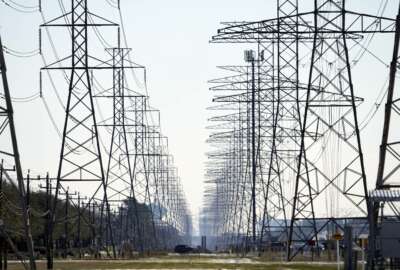

Hubbard Radio Washington DC, LLC. All rights reserved. This website is not intended for users located within the European Economic Area.
What exactly is Congress and the administration talking about when they throw around infrastructure spending?
Best listening experience is on Chrome, Firefox or Safari. Subscribe to Federal Drive’s daily audio interviews on Apple Podcasts or PodcastOne.
What exactly is Congress and the administration talking about when they throw around infrastructure spending? For what possible plans are that involve agencies like the Transportation Department, Federal Drive with Tom Temin turned to someone who’s been following the details closely. Bloomberg Government Congress reporter Jack Fitzpatrick.
Interview transcript:
Tom Temin: We turn to someone who’s been following the details closely, Bloomberg Government Congress reporter, Jack Fitzpatrick. And Jack, this is such a hard bill to understand exactly what they plan to spend, some of its 10 year spending, some is four year spending, let alone what the tax implications are. So, maybe you can sort a little bit out for what it might mean to the federal bureaucracy itself.
Jack Fitzpatrick: Yeah, well, for what it’s worth, it sounds like there’s a pretty positive vibe on Capitol Hill right now in terms of actually trying to get something bipartisan, at least on the infrastructure spending, which means if you’ve heard about Biden’s proposals that go way beyond that, the climate related stuff, the workforce stuff, that’s the kind of thing republicans don’t want to get on board with. And they’ve talked about transportation infrastructure, roads, bridges, also water related infrastructure, that kind of thing, as well as the broadband stuff. The big question then, though, is how do you pay for it? Because Biden’s tax proposals are very, very unpopular among republicans. And when I asked democrats about how do you expect to actually get these corporate tax rate increases through, a lot of members say it’s probably going to have to be in a partisan way through the reconciliation process. So they face a fork in the road to say, are we actually going to do this in a bipartisan way and whittle the spending down to stuff that is traditional infrastructure? Or are we going to try to push something democratic through and get the tax stuff that we want?
Tom Temin: I guess say fork in the road starts with a fork in the tongue or something, maybe not referring to one side or the other but…
Jack Fitzpatrick: They think they both think that about the other side.
Tom Temin: I think so. And so on the, I guess the republicans have offered something, golly, tiny, it’s under a trillion dollars for the direct infrastructure piece.
Jack Fitzpatrick: Yeah, this is a 568 billion from republicans, which even if you ask democrats, a number of them will acknowledge that’s a pretty solid number. It’s good for investing in road repaving. It’s good for replacing lead pipes. It’s good for expanding broadband access to rural areas that don’t have it. A lot of the stuff that even democrats talk about with infrastructure, it’s a pretty solid investment. The issue for democrats, of course, is it doesn’t get into, as I said, the climate related stuff. It’s not as expansive. And it’s not the whole economic bill, because the democrats bill wasn’t really just an infrastructure bill. It was kind of a rebuilding the economy thing. But if they want to do a bipartisan infrastructure bill, they’ve had good talks so far. Shelley Moore Capito, a republican from West Virginia, has continued talking to the White House and both sides have described it as positive. They could find a middle ground on that. The big question, and potentially the intractable divide, is really over taxes.
Tom Temin: Sure. And so on that infrastructure spending at that $576 billion level, is it fair to say most of that money would then go through states, which tend to build the bridges and roads as opposed to the federal government?
Jack Fitzpatrick: Yeah, this is, when it came out from Biden, he described it as a jobs plan. But this isn’t structured the same way as like an FDR, you know, Tennessee Valley Authority, let’s do a bunch of federal stuff and create federal initiatives, largely for the purpose of employing people. The infrastructure stuff is really more an infrastructure package than a jobs package. And it looks like a number of things would go through states. Of course, these are all proposals that they put out in bullet points, and they haven’t turned it into legislative language yet. So a lot of the devil is in the details. And in fact, that will probably shape the the ideas around this very significantly. When they have to actually turn this into legislative language, and people want to offer amendments, it’s going to be subject to a lot of change. But on your point, yeah, this isn’t just a federal jobs program. A lot of this goes through, is going to go through states and that kind of thing to go to the contractors.
Tom Temin: We’re speaking with Jack Fitzpatrick, he’s Congress reporter for Bloomberg Government. And yes, the devil also has a forked tongue, who’s got all those details. Is this pretty much all that Congress is thinking about right now?
Jack Fitzpatrick: Well, it’s kind of a two part thing, because there’s the infrastructure talks that are going relatively well, in a bipartisan sense, but then Biden split off what he’s calling the American Families Plan, which is things like the extension of the Child Tax Credit, childcare, that kind of thing. The stuff that they in the early days we’re calling human infrastructure, that’s not really infrastructure, it’s another economic development kind of thing. That I’m not sure there’s a lot of bipartisan support for a lot of the republican response to that was pretty negative. And, again, the pay for is the tax increases, the big increase in the capital gains tax is an area where you’re not going to get a lot of republican support. So yeah, on infrastructure, that’s where they’re moving forward. They’re talking about the other stuff, the families plan kind of stuff. And then of course, we’ll have more news coming when Biden sends a full budget proposal and that kind of thing. But those two areas are really dominating Washington’s attention right now.
Tom Temin: Yes. And that budget proposal, we saw the skinny outline, or the abbreviated outline of the budget. Is that still on track, maybe for this month, May?
Jack Fitzpatrick: The latest we’ve heard is the rest of the budget, which would include the policy proposals, regulatory stuff, as well as sort of economic projections and tax proposals all built into something holistic, is supposed to come by the end of May. The latest I’ve heard was that John Yarmuth, the House budget chairman said they were expecting it by Memorial Day. So it may take a little while longer to get all the details. But as it pertains to funding the government and the discretionary requests, they’ve got a lot of work left to do. The proposal to do a really significant increase in non defense spending, and barely an increase in defense, and in fact, you could consider it a cut if you adjust for cost of living and inflation, and that kind of thing, obviously, is not going to get republican support. So they haven’t really wholeheartedly gotten into the debate over spending levels and that kind of thing. So they really, I think, have a tough road ahead in terms of appropriations, getting these bills out and doing the regular work of funding the government.
Tom Temin: And by the way, what does this calendar look like for the month of May?
Jack Fitzpatrick: Yeah, the month of May I think is going to largely be dominated by the talks on infrastructure in the back and forth on the related tax measures. And of course, as I was just getting at, they’re gonna have to get started on at least the top level spending talks on regular spending. If they can’t figure out the defense versus non defense spending level pretty soon they’re gonna be in trouble. Because I know the appropriations chair on the House, Rosa DeLauro, has said she wants floor votes on those bills by July, and it takes a while to draft the bills, mark them up. So May’s gonna have to be a busy month for appropriations work, if they actually want to make progress there.
Tom Temin: Are they mostly in session in May?
Jack Fitzpatrick: May, they’re gonna be out, they’re gonna be not in Washington, at least for the first week of May. But it’s a little confusing, because they do committee work weeks when they’re not even there, because they’ve done so much of virtual work. So I know, for example, on the appropriations end they’re going to continue doing the appropriations hearings that they need to do, even though they’re not gonna be holding votes. So they can make progress even when they’re not entirely in session.
Tom Temin: And then finally, with the return of earmarks in some form, those horse trading discussions are also taking place, or starting to?
Jack Fitzpatrick: Yeah, that’s gonna be really interesting as it pertains to the infrastructure package, because there’s a set of earmarks that they’re looking for for transportation authorization. And then they’re also bringing back earmarks for regular appropriations. The deadlines have just recently passed for members to send in their submissions on what they want. We’re gonna see what actually gets picked. They kind of have to reinvent the wheel here and figure out how they want to go about picking these because it’s been a decade since they’ve done earmarks. And they haven’t, they’ve laid out some rules, but they haven’t laid out the entire process for who’s going to get what, other than generally saying they’re going to be about evenly split between republicans and democrats to try to keep everybody relatively happy.
Tom Temin: Fun. Jack Fitzpatrick is Congress reporter for Bloomberg Government. Thanks so much.
Jack Fitzpatrick: Thank you for having me.
Copyright © 2024 Federal News Network. All rights reserved. This website is not intended for users located within the European Economic Area.
Tom Temin is host of the Federal Drive and has been providing insight on federal technology and management issues for more than 30 years.
Follow @tteminWFED



